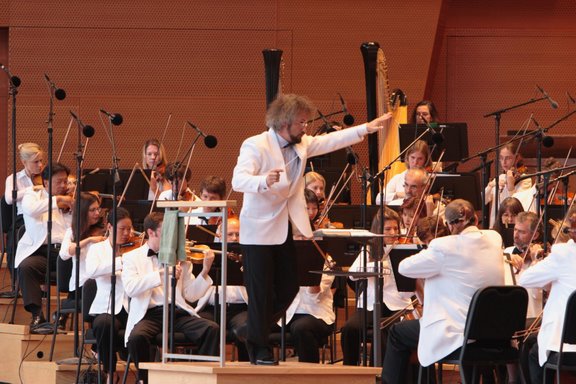Grant Park Festival marks 75th season with charming blast from the past

Charm is a commodity little prized in an era of coarse literalism, useless Twittered information, and instant virtual gratification. The word has taken on something of a pejorative taint, meaning something is superficial and empty, even cheap.
There is such a thing as good charm, however, and on Wednesday night the Grant Park Music Festival presented a concert marking its 75th season that provided enjoyment on its own terms as well as a historical look back.
The music served up by Carlos Kalmar and the Grant Park Orchestra at the Pritzker Pavilion exactly replicated the program presented at the lakefront festival’s inaugural concert July 1, 1935. Ron Magers was the genial and witty host, providing choice anecdotes and memories from the festival’s seven-plus decades.
In addition to Kalmar and company’s polished and lively performances, the evening offered a fascinating snapshot of what was considered standard concert fare three-quarters of a century ago. Among the curios were rarities by Hugo Alfven, Ambroise Thomas and Glazunov. One can make a case that orchestral Wagner and Liszt’s Hungarian Rhapsodies are now infrequent as well, often consigned to pops concerts. What the program lacked in weight, it more than made up for in historical interest and gracious pleasure.
Once a mainstay of the world’s opera houses, Thomas’ Mignon has long since vanished from the repertory. Kalmar and the musicians made a case for the opera with a fizzing account of the effervescent overture, the Grant Park strings bringing great delicacy to the opening and the ensemble performing with nimble grace and panache throughout.
Alfven has certainly been shot out of the canon, yet the prolific Swedish composer’s Midsommarvaka or Swedish Rhapsody No. 1 provided sufficient bait for wanting to hear more of Alfven’s music. The strong flavor of Swedish folk music is manifest in this tone poem and the performance conveyed the rustic qualities and piquant scoring delightfully with evocative clarinet and horn solos by the Grant Park principals.
Ruses d’Amour is today the most neglected of Glazunov’s three ballets (Raymonda and The Seasons being the others). Yet three excerpts made it clear that this too is music worthy of rediscovery, warmly melodic and scored with the Russian composer’s characteristic flair. Concertmaster Jeremy Black and principal cellist Walter Haman provided gorgeous concertante solos in the Grand Pas des Fiances.
Some of the forgotten music wore less well. John Powell’s Natchez on the Hill sounds rather dated with its country fiddling and artless American tropes. Faux Olde England meets West End Victorian musical in Edward German’s three dances from Henry VIII, another quaint period artifact.
Frank W. Meacham’s American Patrol is largely a medley of popular American tunes—Columbia, the Gem of the Ocean dropping by in Ivesian fashion. Glen Miller retooled Meacham’s one original theme for his big band and Miller’s classic swing version manages to make Meacham’s march tune seem decidedly stiff by comparison.
On the Beautiful Blue Danube could have used richer string sonority, but Kalmar leaned into Strauss’s waltz rhythms with idiomatic Austrian élan. Wagner’s Entrance of the Guests from Tannhauser led off the evening in an elegant rendering, refreshingly free of bombast. And Liszt’s Hungarian Rhapsody No. 2 received a terrific performance with Kalmar’s scrupulous balancing ensuring clarity without sacrificing Magyar fire.
But mostly, this was a night of celebration, with the nation’s only free summer music festival continuing to serve Chicago with innovative programming and superb performances. May it continue for another 75 seasons and more.
Posted in Performances


